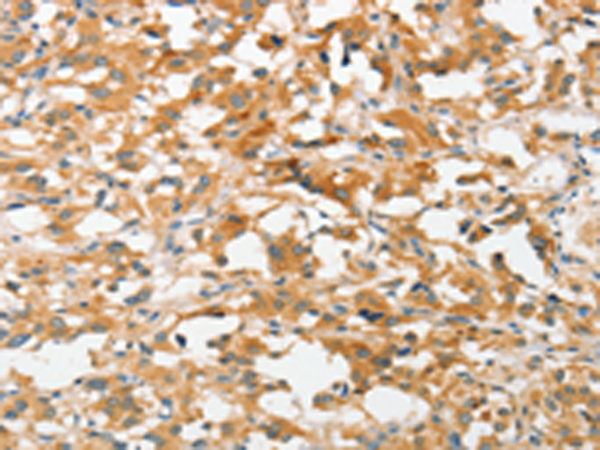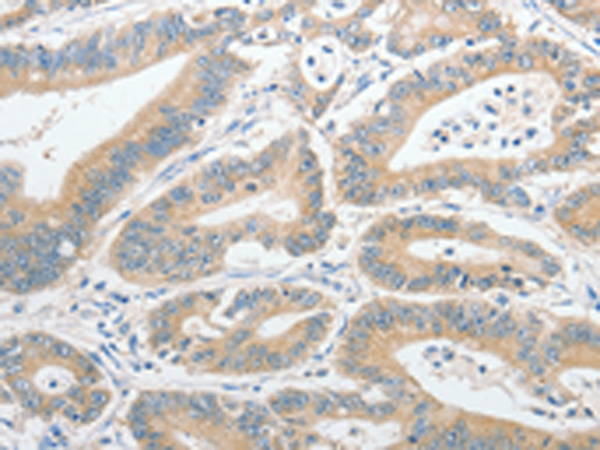

| WB | 咨询技术 | Human,Mouse,Rat |
| IF | 咨询技术 | Human,Mouse,Rat |
| IHC | 1/25-1/100 | Human,Mouse,Rat |
| ICC | 技术咨询 | Human,Mouse,Rat |
| FCM | 咨询技术 | Human,Mouse,Rat |
| Elisa | 1/2000-1/5000 | Human,Mouse,Rat |
| Aliases | UCH37; CGI-70; INO80R; UCH-L5 |
| Host/Isotype | Rabbit IgG |
| Antibody Type | Primary antibody |
| Storage | Store at 4°C short term. Aliquot and store at -20°C long term. Avoid freeze/thaw cycles. |
| Species Reactivity | Human, Mouse |
| Immunogen | Fusion protein of human UCHL5 |
| Formulation | Purified antibody in PBS with 0.05% sodium azide and 50% glycerol. |
+ +
以下是关于UCHL5抗体的3篇参考文献及其摘要概括:
1. **文献名称**: "UCHL5 regulates the 26S proteasome activity through editing ubiquitin chain topology"
**作者**: Song et al.
**摘要**: 该研究揭示了UCHL5作为去泛素化酶,通过调节泛素链的拓扑结构影响26S蛋白酶体的活性。研究表明,UCHL5与蛋白酶体亚基RPN13结合,调控底物降解效率,为癌症治疗提供了潜在靶点。
2. **文献名称**: "UCHL5 modulates DNA damage repair via deubiquitinating BRCA1"
**作者**: Tian et al.
**摘要**: 文章发现UCHL5通过去泛素化BRCA1蛋白,增强其在DNA损伤修复中的功能。实验显示,UCHL5缺失导致细胞对电离辐射敏感,提示其在基因组稳定性中的关键作用。
3. **文献名称**: "Overexpression of UCHL5 in ovarian cancer and its therapeutic targeting"
**作者**: Wang et al.
**摘要**: 该研究报道UCHL5在卵巢癌中高表达,并通过激活NF-κB通路促进肿瘤进展。使用特异性抗体阻断UCHL5可抑制肿瘤生长,为卵巢癌治疗提供了新策略。
以上文献均涉及UCHL5的功能机制及抗体应用,涵盖基础机制与临床转化研究。
The UCHL5 antibody is a crucial tool for studying the ubiquitin carboxyl-terminal hydrolase L5 (UCHL5), a deubiquitinating enzyme (DUB) involved in regulating protein turnover via the ubiquitin-proteasome system. UCHL5. also known as UCH37. selectively removes ubiquitin chains from substrates, enabling precise control of protein degradation. It associates with the proteasome through binding to RPN13. facilitating substrate processing and recycling of ubiquitin. UCHL5 plays dual roles in cancer, acting as either an oncogene or tumor suppressor depending on cellular context, and is implicated in DNA repair, cell cycle regulation, and apoptosis. Dysregulation of UCHL5 has been linked to malignancies, neurodegenerative disorders, and immune diseases.
UCHL5 antibodies are widely used in research to detect protein expression, localization, and functional interactions via techniques like Western blotting, immunohistochemistry, and immunoprecipitation. These antibodies help elucidate UCHL5's mechanistic roles in disease pathways and its potential as a therapeutic target. Commercially available antibodies are typically raised against specific epitopes of human UCHL5. with validations ensuring specificity for experimental accuracy. Ongoing studies focus on developing UCHL5 inhibitors, underscoring the antibody's importance in both basic research and drug discovery.
×